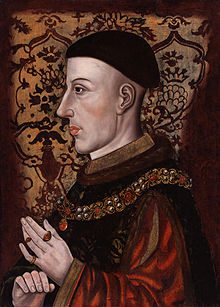Henry (given name)

King Henry V of England
|
|
| Pronunciation | /hɛnriː/ |
|---|---|
| Gender | masculine |
| Name day | July 13 |
| Word/name | England |
| Meaning | from German Heinrich |
| Related names | Henri (French), Enrique (Spanish), Henrique (Portuguese), Harry (nickname), Henrik (Scandinavian), Henryk (Polish), Jindřich (Czech), Hynek (Czech), Heinz (German), Hendrik (Dutch), Heinrich (German), Enrico (Italian), Enzo (Italian); Henrietta (feminine), Harriet (feminine) |
Henry is an English male given name and surname derived from Old French Henri/Henry, itself derived from the Middle High German name Heinrich, from Old High German Haimirich (from "home" and rich "ruler"), which was conflated with the name Haginrich (from hagin "enclosure" and rich "ruler").
The Old High German name is recorded from the 8th century, in the variants Haimirich, Haimerich, Heimerich, Hemirih.Harry, its English short form, was considered the "spoken form" of Henry in medieval England. Most English kings named Henry were called Harry. The name became so popular in England that the phrase "Tom, Dick, and Harry" began to be used to refer to men in general. The common English feminine forms of the name are Harriet and Henrietta.
Henry has been a consistently popular name in English-speaking countries for centuries. It was among the top 100 most popular names used for boys born in the United States, England and Wales, and in Australia in 2007. It was the 46th most common name for boys and men in the United States in the 1990 census. Harry, its short form, was the fifth most popular name for boys in England and Wales in 2007 and among the top 50 names in Ireland, Scotland and Northern Ireland in recent years. Harry was ranked as the 578th most popular name in the United States in 2007.
In the High Middle Ages, the German name was Latinized as Henricus. It was a royal name in Germany, France and England throughout the high medieval period (Henry I of Germany, Henry I of England, Henry I of France) and widely used as a given name; as a consequence, many regional variants developed in the languages of Western and Central Europe:
...
Wikipedia
